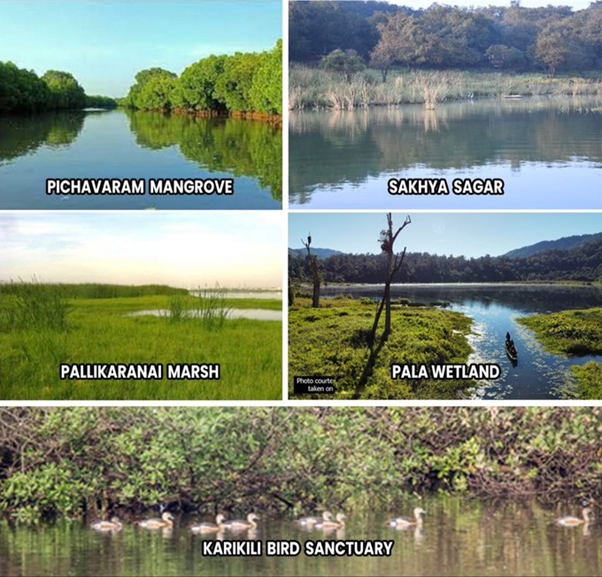

27th July 2022 (8 Topics)
Context
India has recently designated five new wetlands of International importance.
About
Key-highlights of the addition
- With the new addition, the Ramsar sites have been increased from 49 to 54 Ramsar sites in India.
- The new addition are as given below:
|
Three wetlands of Tamil Nadu |
Wetland of Mizoram |
Wetland of Madhya Pradesh |
|
|
|

Important facts about the new sites
Karikili Bird Sanctuary:
- Karikili Bird Sanctuary is a 61.21-hectare protected area located in the Kancheepuram District of Tamil Nadu.
- The sanctuary is about 75 km from Chennai, south of Chengalpattu.
Pallikaranai Marsh Reserve Forest:
- Pallikaranai wetland is a freshwater marsh located in Chennai, Tamil Nadu.
- It is the only surviving wetland ecosystem of the city and among the few and last remaining natural wetlands of South India.
Pichavaram Mangrove:
- Pichavaram mangrove is located in a village near Chidambaram in Cuddalore District of Tamil Nadu.
- The mangrove is one of the largest mangrove forests in India, covering 1100 hectares.
Pala wetland:
- The Pala wetland is the largest natural wetland in Mizoram.
- The renowned landmark is surrounded by green woodlands and home to rich diversity of animal species including a range of animals and birds.
Sakhya Sagar:
- Sakhya Sagar Lake is an integral part of the beautiful ecology of the Madhav National Park in Shivpuri, Madhya Pradesh.
India’s Ramsar Sites:
- India’s Ramsar wetlands are spread over 11,000 sq km — around 10% of the total wetland area in the country — across 18 States.
- No other South Asian country has as many sites though this has much to do with India’s geographical breadth and tropical diversity.
- The United Kingdom (175) and Mexico (142) — smaller countries than India — have the maximum Ramsar sites whereas Bolivia spans the largest area with 148,000 sq km under the Convention protection.
Ramsar Sites
- These are wetlands deemed to be of "international importance" under the Ramsar Convention.
- It is named after the city of Ramsar in Iran, where the convention was signed in 1971.
- Ramsar sites are trans-boundary in which case more than one Contracting Party is responsible for their conservation and management.
- The inclusion in the list is for-
- the conservation and sustainable use of wetlands,
- recognizing the fundamental ecological functions of wetlands and their
- Economic value.
- Cultural value
- Scientific value
- Recreational value
- It is also known as the Convention on Wetlands.
|
Wetland
|


